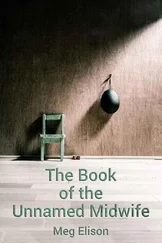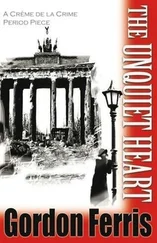The doctor appointments started up again. He wasn’t well that time for thirteen months.
On the night Jane picked him up at African Hair Weaving, he knocked on Becka’s door. “Can I come in?” he asked. No response usually meant her begrudging acquiescence, so he turned the knob and eyed her for permission to enter. She sat up against the headboard.
“What do you want?”
“To apologize.”
“For what?”
He sat down on the bed. “For ignoring you.”
She drew her legs up to her chest and hugged her knees. Her thighs expanded in their black sweatpants.
“Let me try to explain,” he said. “I’ve always felt a strong sense of duty to provide for you and your mom. I’ve worked hard so that you would never have to want for anything.”
She looked at him skeptically. “I don’t really think that’s why you worked hard.”
“And that meant,” he said, “that I had to put certain opportunities aside.”
“Like what?” she asked. “Like did you want to become a painter on the Left Bank?”
“I mean opportunities with you.”
“Or an astronaut? Did I keep you from becoming an astronaut?”
“I would have liked to spend more time with you,” he said. “And your mother would have liked me around more.”
“So she could have somebody else to bitch at besides me?”
“Becka,” he said. He put a hand up. “Give me a second here, okay?”
She frowned and grew quiet.
“But the last couple of years,” he said, “the last couple of years have been different.”
He stared into the dead aquarium in front of him, a quarter full of rock-and-roll buttons and Mardi Gras beads and CDs and cigarette papers.
“Different how?” she asked.
“The last couple of years,” he said, “I haven’t really wanted to be around you.”
He turned on the bed to look at her, making a small vortex of the sheets below him. She didn’t move. They were never still anymore in each other’s presence. There was always some context for movement, some unspoken vectoring away. Now they stared as if startled by each other, years after having forgotten what the other looked like.
“I love you more than anyone in the world,” he said, “but I didn’t give a damn if I saw you or not. I didn’t understand the phase you’re in. The duct-taped sneakers, the dreadlocks. The music.”
“Right. It’s so hard. The Beatles.”
“You don’t just listen to the Beatles,” he said.
“Ew,” she said, “the Ramones.”
“Point is,” he said, “I hid behind my duty. I used work as my excuse to avoid you.”
He said he was sorry. He didn’t anticipate her saying anything in response and didn’t expect it or need to be absolved or even understood. He needed only to come clean. She said nothing as he left the room.
She found him sitting at the kitchen counter slouched over an uneaten orange, looking morose and inward. It had been only a few minutes, five at the most, since he’d left her, but in that time the kitchen had filled entirely with the weight of his self-pity. When he got like this, bundled up in his coat and carrying around his backpack, she wanted nothing more than to beat a retreat the hell away from him. It was like he was dying or something, when he wasn’t dying. He was just worried that he couldn’t go in to work anymore. It made him grumpy. He wasn’t even sick really.
“You think I care?” she asked.
He turned on the stool. She stood on the runner in her torn flannel and concert tee, barefoot, hands on her hips.
“You think I’ve been waiting around this whole time for an apology? That I give a shit what you think or what you do?”
He put his hands in the pockets of his down jacket. It was a defeated gesture, as if he were the child his daughter was scolding.
“The only reason you’re apologizing is because you’re sick again. If you weren’t, you wouldn’t have even thought about it. You could have been stoned on crack since I started high school, nothing would be different. You think too much of yourself, Dad.”
And with that she turned and went back upstairs.
Coffee and a powdered doughnut sat on his desk. He might have thought to get something more substantial but he didn’t care to interrupt the flow of work. Night after night, he sat at his desk just as a sphere of oil sits suspended in dark vinegar — everything blotted out but his own source of light. To save on energy costs, Troyer, Barr and Atkins, LLP, had installed motion sensors on the overhead lights. From six in the morning until ten at night, the lights burned continuously; after ten, the sensors took over. He worked past ten most nights, and most nights found him sufficiently absorbed in something that required only the turn of a page or the click of a mouse — too little activity for the sensors to register. The lights frequently switched off on him. He’d look up, surprised again — not just by the darkened office. By his reentry into the physical world. Self-awareness. Himself as something more than mind thinking. He’d have to stand, a little amused by the crude technology, and wave his arms around, jump up and down, walk over and fan the door, sometimes all three, before the lights would return.
That was happiness.
Twenty-five years ago he had decided to go to law school. It offered interesting study and good career prospects. He made it to Harvard and quickly learned how to chew up and spit out the huge green tomes on civil litigation and constitutional law. He summered at Troyer, Barr and they asked him to return after graduation. But first there was a clerkship with a judge on the Second Circuit. A year later he was married to Jane. He worked hard at Troyer. Document production for the first couple of years, boring as hell, but then junior status gave way to opportunity. He started taking depositions. He showed a gift for strategy in both civil and criminal cases, and a rare composure in the courtroom. He impressed the right people and when his seventh year came around they voted to make him partner. He sat in the best restaurants and ordered the best wines.
But that was never the point. The point was Houston, Seattle, Pittsburgh, Orlando, Charleston, Manhattan — wherever the trial was. The trial, that was the point. The clients. The casework. The war room. He took on a few pro bono causes. And he worked in midtown amid the electricity and the movement. And his view of Central Park was breathtaking. And he liked the people. And the money was great. And the success was addictive. And the pursuit was all-consuming. And the rightness of his place was never in doubt.
Now it was morning, and he was preparing for trial. The case involved a client named R. H. Hobbs who had been accused of stabbing his wife in a methodical way and dumping her body in a decommissioned landfill on Staten Island. The evidence against R.H. was entirely circumstantial. There was a blood-soaked bedsheet with no trace of a third party’s DNA, his thin alibi of being stuck in traffic at the time of the murder, and a sizable life-insurance policy. The district attorney had managed to bring charges against him only by the skin of his teeth. Grand jury testimony revealed a case fraught with uncertainty, and the consensus among Tim and his team was that R.H., despite a loveless marriage, had not committed the crime he had been accused of. R.H.’s private equity firm generated an enormous amount of business for Troyer, Barr, and no one wanted a guilty verdict to interfere with that relationship.
He ate the doughnut over a napkin to catch the powdered sugar and recalled a time when he had watched what he ate. Not as a dieter, not with his daughter’s sad South Beach struggle, but with a fanatic’s vigilance for good health — for Bagdasarian had suggested that it might be dietary. Cut out the caffeine, Bagdasarian told him, the sugar and the nicotine, and consult a naturopath. And so he did. Because nothing had shown up, repeatedly, on the MRIs, because he was on his third psychiatrist, because the specialist in Switzerland had thrown up his hands, he saw a Trinidadian in Chelsea with golden tubes and magic roots for seven days of colonics and grass-and-carrot smoothies. Jane drove and waited in the naturopath’s living room among primitive wood carvings and bright tropical art. They took the highway home, and for the first couple of days there was this breathless, anxious hopefulness. Then he walked right out of the house. Jane picked him up six hours later behind a Starbucks in New Canaan. Nothing came of the marmalade fast or the orange juice cleansings except another possibility to cross off the list, though he could move his bowels like a ten-year-old.
Читать дальше












